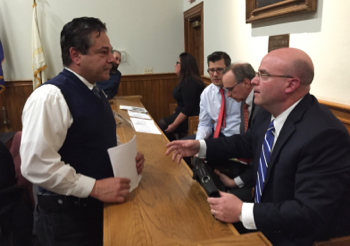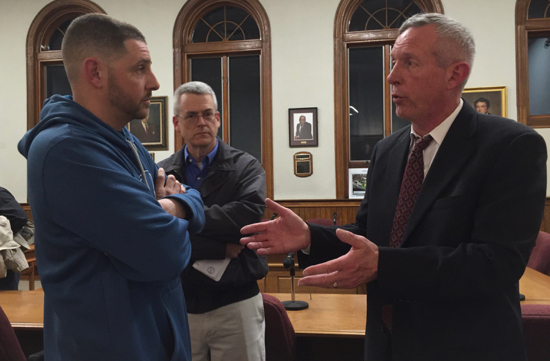The Aldermen now hope to get the questions on the November election ballot.
Aldermen said that in the meantime, city officials can continue to tweak the borrowing plan, which was met with heavy criticism during a public meeting last last month.
The 13 – 1 vote to delay the referendum came after the second straight meeting at which several prominent city Democrats voiced questions and concerns about the plan put together by the administration of Mayor David Cassetti, a Republican.
The Valley Indy recorded Thursday’s meeting in its entirety. Click the play button on the video above to watch.
Previously
Municipalities use capital improvement plans to map out the funding of things like building construction and equipment or land purchases over many years. Often, cities use bonding to fund capital improvement items so the costs associated with them can be spread out over several years.
City officials have been working on a five-year capital improvement plan since last summer.
They originally envisioned a June 7 referendum at which several questions would ask residents to approve a total of $5.9 million in bonding for 2016 – 2017, broken down as:
- $900,000 for the Board of Education
- $160,000 for the Ansonia Nature Center
- $250,000 for infrastructure improvements at city-owned buildings
- $1,150,000 for public safety — police, fire, and ambulance
- $1,370,000 for public works
- $2,160,000 for roads
Aldermen have also been discussing a “long-range” capital plan with more capital spending planned in each of the next five years. The five-year plan is still in draft form. As of mid-March, the draft totaled roughly $21 million in planned spending, about $13.5 million of which would be bonded.
Last week Aldermen seemed poised to send the first year of capital plan expenditures to a June 7 public vote.
But at a March 29 public hearing, a parade of residents — many of whom were Democrats who served in the administration of Cassetti’s predecessor, James Della Volpe — raised concerns about the plan, after which Aldermen delayed a vote on the matter.
Click here for a previous story.
Plan Revised
At Thursday’s meeting, officials presented a revised plan aimed at addressing concerns raised last week.
For instance, several residents complained that the city shouldn’t use bonding to pay for vehicles. So Cassetti’s staff created a separate “vehicle replacement schedule” covering the next five years and left it up to the Aldermen to decide how to pay for them.
So in essence, two capital plans were put before the Aldermen Thursday — one with the vehicles included, totaling roughly $4.3 million in bonding, and one without, totaling $3.9 million.
The $4.3 million plan was broken down as:
- $900,000 for the Board of Education
- $55,000 for the Ansonia Nature Center
- $250,000 for infrastructure improvements at city-owned buildings
- $545,000 for public safety
- $355,000 for public works and city-wide building upgrades
- $2,160,000 for roads
Article continues after document handed out at Thursday’s meeting offering a little more detail.
Ansonia Revised Bond Resolution
But as many speakers noted during the public portion of Thursday’s meeting, the revisions had been filed in the clerk’s office at City Hall only a few hours prior.
Kevin Blake, the city’s former corporation counsel under the Della Volpe administration, said that’s not enough time for the public — or Aldermen — to review it.
“I’m not sure what the public is getting for information,” he said, noting that the city’s website still had a link to the $5.9 million plan that was scotched last week on its front page.
Blake also worried the city is putting too much spending on its credit card in the form of long-term borrowing.
David Knapp, the chairman of the city’s Democratic Town Committee, echoed Blake’s sentiments, asking for more details.
He also asked Aldermen to publish a full accounting of a previous referendum, approved by voters in 2013.
“What was done? What projects haven’t been done? What’s the game plan and what’s the timetable for completing those projects?” he asked.
Bartholomew Flaherty, a former chairman of the Planning and Zoning Commission, noted that last year the city took $2 million from its general fund to deliver a small tax break to residents.
By all indications, the city will have to do the same thing this year.
Flaherty questioned why the city wanted to borrow money, given the uncertainty of the state budget.
The city’s corporation counsel, John Marini, said the city’s general fund is well above the “threshold of concern.”
“You’re not concerned,” Flaherty said. “I’m concerned, myself.”
 Financial Pros Speak
Financial Pros Speak
The president of the board, Phil Tripp, then asked the city’s bond counsel, Joseph Fasi, to explain the basics of capital plans, and how municipalities fund them with short- and long-term bonds.
Later, the city’s chief financial adviser — Barry Bernabe, managing director of Phoenix Advisors, LLC — gave Aldermen a presentation on the current status of the city’s debt.
He said the city’s current annual deb service costs stand at about $2 million.
Because of low interest rates and the city’s healthy credit rating, Bernabe said Ansonia could — though he wouldn’t recommend it — borrow $4 million per year for each of the next several years and not see its debt costs rise, since spending associated with prior projects will fall off the books as they’re paid for.
Bernabe also said the city will likely be successful in getting its credit rating upgraded, which could mean even lower borrowing costs.
Article continues after a copy of Bernabe’s presentation handed out to the Aldermen.
To Be Continued
Seventh Ward Alderman David Blackwell noted the possible bond rating upgrade, saying why not wait and see whether borrowing costs could come down?
“This should be a work in progress,” Blackwell said. “Where’s the fire? … I’d rather wait to see if our (credit rating) gets upgraded.”
Blackwell also questioned the wisdom spending roughly $15,000 on a referendum in June when there is a national election already scheduled for November. The city can get the bond questions out to voters then.
He said the city should in the meantime put together detailed budget projections for the next five years to give Aldermen — and residents — more information.
“We don’t need to vote on this right now,” Blackwell said.
First Ward Alderman Charles Stowe asked Cassetti what he wanted to do.
“I’d like to wait until November,” the mayor said.
Aldermen voted 13 – 1 to table the plan. The Sixth Ward’s Patrick Henri voted no.
 Reaction
Reaction
After the meeting, Henri said the Aldermen had enough information to put the plan to voters now.
“We’ve had meetings with all the department heads, they’ve whittled down the list. They’re all looking for their vehicles in the June referendum,” he said. “Now they’re going to have to wait six months … Everything gets pushed off with no coordination with them. I just think that’s wrong.”
Tripp said he agreed with Henri — and that a “good” bond resolution now would allow the city to accomplish things it will have to put off while waiting for a “perfect” plan in November. But he said that he voted for Blackwell’s motion because that’s what the consensus of the board seemed to be.
Cassetti said the plan needs more work.
“I want to review it more,” he said.
Asked why it was brought forward last week with a view to putting it on a June referendum ballot, the mayor said he had already been leaning toward putting it off until November.
“Believe it or not, if you noticed last week I was very quiet. I was just listening,” Cassetti said. “I wasn’t showing any favoritism towards it because I wanted to hear from the people. But I’ve been pushing for a November referendum anyways.”
Marini, the city’s corporation counsel, said the plan could have gone to voters in June. He pointed out the Aldermen discussed the plan at meetings prior to last week, and said the Democrats were using the capital plan to score points.
“Unfortunately the well was poisoned by some of the partisan political operatives in the audience,” he said, adding later: “It could have gone either way and I’d be fine with it.”
Knapp and Flaherty said they weren’t motivated by politics — just the city’s financial well-being.
“I’m happy to see that they slowed it down,” Knapp said. “Democracy works.”